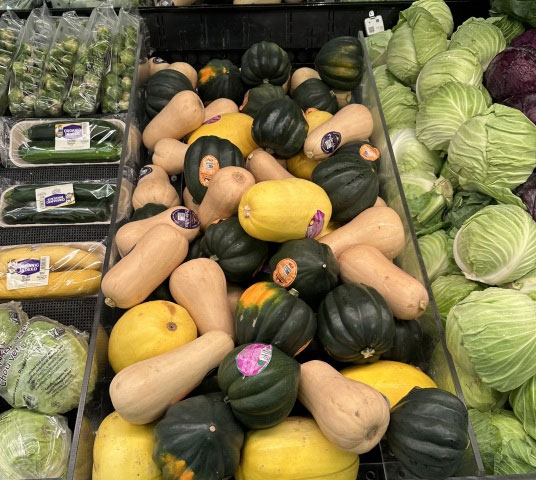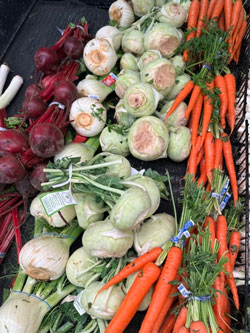
Photo courtesy of We Energies
The 2023 We Energies Cookie Book includes recipes for homemade dog treats.
Now that we are in the holiday season, thoughts of savory recipes may evoke fond memories. At this time of year, the thought of cooking for your dog may also enter your mind as you consider ways to delight your pet during the holiday season.
“Home cooking can have many benefits for dogs,” said Kristin Bevirt-Patneaude. “It can be a wonderful way to incorporate vitamin- and mineral-rich fresh foods into your dog’s diet. It can also help encourage an appetite if your pooch tends to be a picky eater.”
She explained that cooking for a dog with dietary restrictions offers a way to have control over the ingredients in meals. “I think cooking for your dog can also strengthen the human-animal bond, she said. “It’s a way of expressing your love for them.”

It’s very important to be mindful of what ingredients go into home-cooked meals to ensure the dog is getting the vitamins and minerals that are essential for good health. There are many resources available to determine how best to prepare foods, and Patneaude suggests working fresh foods into a commercial dog-food diet over time.
“A very simple approach is to begin by using fresh foods as healthy snacks rather than biscuits or other treats,” she said. “You can also use wholesome ingredients to top dress your pet’s current formulated kibble or canned food. In this case, it’s important to be sure the mixture of fresh foods you are adding doesn’t exceed 10 percent of your pet’s meal to avoid offsetting the nutrient profile of the commercial food.”
Patneaude said to be mindful that not all whole foods people eat are safe for dogs. “Because something is a healthy food for humans, that doesn’t mean it is for dogs. For example, grapes, cherries, onions, chives, avocados, macadamia nuts, chocolate, raisins garlic and other fruits and vegetables are great for people but can actually be toxic for dogs. It’s important to find out which fruits and vegetables are good for them.”
She said cruciferous vegetables such as broccoli, kale and cauliflower stimulate detoxifying enzymes in the liver and gut. Spinach is high in calcium, magnesium and iron, while carrots are a good source for antioxidants such as beta-carotene, potassium and vitamin A. Squash is also good for beta-carotene, along with vitamin C and fiber.
“Blueberries and cranberries are rich with antioxidants. They contain proanthocyanidins, which are compounds that decrease the ability of certain bacteria to adhere to the bladder wall; therefore, they offer support for dogs prone to urinary tract infections,” said Patneaude. “Oatmeal is a healthy grain and a great source of protein and beta glucan soluble fiber, which supports digestive health.”

If you cook for your dog, always use high-quality fresh or frozen whole food ingredients. “Ideally use organic foods whenever possible, because they tend to have a higher vitamin and mineral content,” said Patneaude. “Avoid foods like processed meats or canned vegetables that may contain preservatives and added salt.”
It’s a good idea to check with your veterinarian about adding new foods to your dog’s diet, she said. Some dogs who have health conditions might not be able to tolerate some foods, even if they are wholesome. Patneaude said people who use pet recipes that call for vitamin or mineral supplements should always be certain the ingredients have the NASC seal on them.

“The National Animal Supplement Council is a nonprofit organization that promotes high-quality supplements,” said Patneaude. “The NASC requires members to adhere to good manufacturing practices, pass independent third-party audits every two years, and undergo random testing to ensure their label claims are accurate. Since the Federal Drug Administration does not regulate human or pet supplements, membership in the NASC is the best way for pet supplement companies to be held accountable for their label claims and quality of their products.”
One other thing dog chefs should check is whether supplements used in recipes are heat stable and can be added during the cooking process without losing their effectiveness. Patenaude said some quality supplement companies to look for include Nordic Naturals, Wisconsin-based Herbsmith, Vetri-Science, Pet Honesty, Rx Vitamins for Pets and Nutramax.
It’s not enough to just select healthy ingredients when you cook for your dog. If you don’t also make sure your food meets the standard for balance and completeness, your dog could become deficient in essential nutrients and become unhealthy.
“There are many recipes available in books and online, but many of them have not undergone evaluation by veterinary nutritionists or gone through the Association of American Feed Control Officials’ feeding trials that ensure the meals are complete, balanced and can be fed long term to your pet.”

Greendale Village Vet offers the following resources for owners to check as they begin formulating ways to start cooking for their dogs:
- https://balance.it/ is a website designed by Dr. Sean Delany, board certified veterinary nutritionist and past nutrition faculty member of University of California, Davis. This website offers services to build custom balanced recipes for your dog or cat. You can choose your own ingredients. The company also offers supplements to balance the diet for healthy pets and those with health conditions like kidney disease.
- https://animaldietformulator.com/ is a website that provides dietary consultations with integrative veterinarians, basic recipes for purchase, and custom diet formulation for specific pet needs.
- https://www.petdiets.com/Homemade-Diets is a website designed by board-certified veterinary nutritionists who provide consultations for specific health conditions and homemade diet recipes and supplements.

- https://www.thefarmersdog.com/diy is a website providing recipes and do-it-yourself nutrient mixes based on your dog’s needs and ingredient preferences. Its recipes are designed by board-certified veterinary nutritionists. Also, its premade foods available for purchase have undergone AFFCO feeding trials to demonstrate they are complete and balanced to feed long term to your dog.
- utvns@utk.edu is the contact for the University of Tennessee Veterinary Nutrition Service available for nutrition consultations.
“Cooking for your dog can be a very rewarding,” said Patneaude. “When done properly it can be fun and improve your dog’s health and quality of life. These tips and resources can get you on your way to doing it safely!”
For more information, visit https://greendalevillagevet.com/ or call 414-421-1800.







Leave A Comment